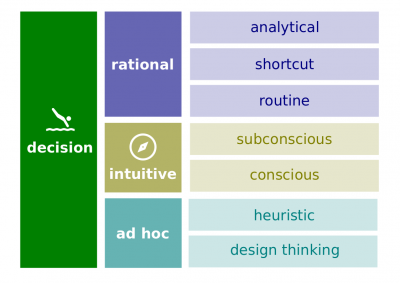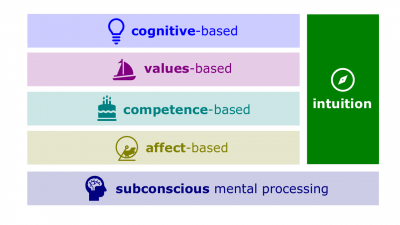Difference between revisions of "Decision-making approach"
(→Related coursework) |
|||
| Line 3: | Line 3: | ||
==Related concepts== | ==Related concepts== | ||
*[[File:Intuition.png|400px|thumb|right|[[Intuition]]]][[Intuition]]. An instinctive feeling not necessarily supported by research. | *[[File:Intuition.png|400px|thumb|right|[[Intuition]]]][[Intuition]]. An instinctive feeling not necessarily supported by research. | ||
| − | *[[Intuitive decision making]]. Unconscious [[decision making]] on the basis of distilled experience, feelings, and accumulated judgment. | + | *[[Intuitive decision-making]]. Unconscious [[decision-making]] on the basis of distilled experience, feelings, and accumulated judgment. |
*[[Rationale]]. A reasoning characterized by making consistent, value-maximizing choices within specified constraints. | *[[Rationale]]. A reasoning characterized by making consistent, value-maximizing choices within specified constraints. | ||
| − | *[[Rational decision making]]. [[Decision making]] that produces choices that are logical and consistent and maximize value. | + | *[[Rational decision-making]]. [[Decision-making]] that produces choices that are logical and consistent and maximize value. |
==Related lectures== | ==Related lectures== | ||
Latest revision as of 23:10, 5 January 2019
Decision-making approach (hereinafter, the Approach) is a particular manner of taking preliminary steps toward making a decision.
Related concepts
- Intuition. An instinctive feeling not necessarily supported by research.
- Intuitive decision-making. Unconscious decision-making on the basis of distilled experience, feelings, and accumulated judgment.
- Rationale. A reasoning characterized by making consistent, value-maximizing choices within specified constraints.
- Rational decision-making. Decision-making that produces choices that are logical and consistent and maximize value.

